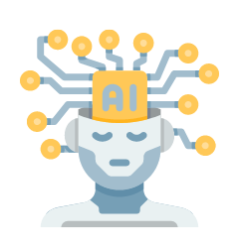The term artificial intelligence (AI) refers to the emulation of human cognition in computers that have been programmed to mimic human reasoning and learning processes.These intelligent systems are able to carry out tasks like speech recognition, visual perception, decision making, and language translation that normally need human intellect. Artificial Intelligence (AI) comprises an extensive array of methodologies, ranging from conventional rule-based systems to sophisticated machine learning and neural network techniques.
Types of Artificial Intelligence
Artificial intelligence may be classified into three main categories: superintelligent AI, general AI, and narrow AI.Weak AI, often called narrow AI, aims to do a particular job, such facial recognition or internet searches.Strong artificial intelligence, or general AI, can understand, learn, and apply intelligence to a range of tasks, just like human cognitive abilities. Theoretically, superintelligent AI might revolutionise technology and society by outperforming human intelligence and capabilities.
1.Narrow Artificial Intelligence
It is capable of carrying out particular tasks like speech recognition.
2.General Artificial Intelligence
Which is capable of learning and comprehending any intellectual endeavour that a person can.
3.Super intelligent Artificial Intelligence
Which currently exists only in theory and is superior to human intellect.
Applications of Artificial Intelligence
There are a lot of uses for AI in different sectors. In healthcare, artificial intelligence (AI) is used to diagnose illnesses, provide personalized treatment plans, and forecast patient outcomes. Artificial intelligence (AI) technologies are used in finance to forecast investments, automate customer service, and identify fraud. The auto industry is utilizing AI to create autonomous vehicles in an effort to increase productivity and safety. As technologies boost efficiency and offer convenience, AI-powered virtual assistants like Siri and Alexa have also become essential in daily life.
Ethical Considerations and Challenges
The rapid advancement of AI technology raises a number of ethical concerns and challenges. Data privacy, biased AI systems, and job displacement due to automation are all significant concerns. Open, accountable, and egalitarian AI systems are necessary to eradicate bias and abuse. Legal and ethical guidelines are also part of AI research to reduce risks and ensure that rewards are distributed equitably.
In summary, artificial intelligence is a fantastic instrument that might have a significant impact on many aspects of human existence. Despite all of its benefits, its inclusive and long-term growth hinges on finding solutions to the ethical and social problems it brings up.

